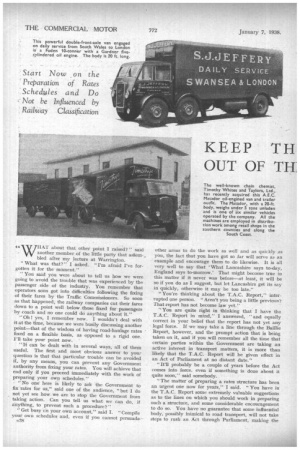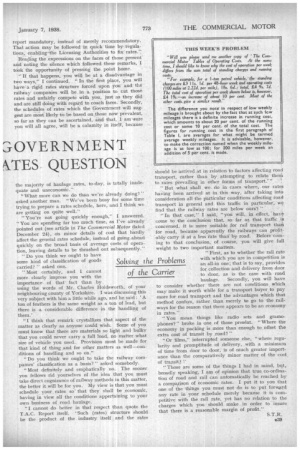KEEP TH 30VTRNMENT OUT OF TH ?NIES QUESTION
Page 22

Page 23

If you've noticed an error in this article please click here to report it so we can fix it.
Start Now on the ' Preparation of Rates :Schedules and Do v Not be Influenced by ,Railway Classification
11 I-1,kT about that other point I raised?" said
another member of the little party that as§em-,, bled after my lecture at Warrington.
" What was that?" I asked. "I'm afraid I've forgotten it for the moment."
"You said you were about to tell us how we were going to avoid the trouble that was experienced by the passenger side of the industry. You remember that operators soon got into difficulties following the fixing of their fares by the Traffic Commissioners. So soon as that happened, the railway companies cut their fares down to a point well below those fixed for passengers by coach and no one could do anything about it."
"Oh! yes, I remember now. I wouldn't deal with it at the time, because we were busily discussing another point—that of the wisdom of having road-haulage rates fixed on a flexible basis, as opposed to a rigid one. 1'11 take your point now. • " It can be dealt with in several ways, all of them useful. The first and most obvious answer to your question is that that particular trouble can be avoided if, by any means, you can prevent any Government authority from fixing your rates. You win achieve that end only if you proceed immediately with the work of preparing your own schedules."
"No one here is likely to ask the Government to fix -rates for us," said one of the audience, "but I do not yet see how we are to stop the Government from taking action. Can you tell us what we can do, if anything, to prevent such a procedure?"
"Get busy on your own account," said I. "Compile your own schedules and, even if you cannot persuaden3.3
other areas to do the work as well and as quickly As you, the fact that you have got so far will serve as an example and encourage them to do likewise. It is all very well to say that 'What Lancashire says to-day, England says to-morrow.' That might become true in this matter if it never was before—at least, it will be so if you do as I suggest, but let Lancashire get its say in quickly, otherwise it may be too late."
"You're thinking about the T.A.C. Report," interrupted one person. "Aren't you being a little previous? That report has not become law yet."
"You are quite right in thinking that I have the T.A.C. Report in mind," I answered, "and equally correct in your belief that the report has not yet any legal force. If we may take a line through the l3aillie Report, however, and the prompt action that is being taken on it, and if you will remember all the time that certain parties within the Government are taking an active interest in transport matters, it is more than likely that the T.A.C. Report will be given effect in an Act of Parliament at no distant date."
"It'll probably be a couple of yeari before the Act comes into force, even if something is done about it quite soon," said somebody.
"The matter of preparing a rates structure has been an urgent one now for years," I said. "You have in the T.A.C. Report some extremely valuable suggestions as to the lines on which you should work in preparing such a structure, and some considerable encouragement to do so. You have no guarantee that some influential body, possibly inimical to road transport, will not take steps to rush an Act through Parliament, making the
report mandatory, instead of merely recommendatory. That action may be followed in quick time by regulations, enabling-the Licensing Authorities to fix rates.'' Reading the expressions on the faces of those present" and noting the silence which followed these remarks, I took the opportunity of pressing the point home.
"If that happens, you will be at a disadvantage in two ways," I continued. "In the first place, you will have a rigid rates structure forced upon you and the railway companies will be in a. position to cut those rates and unfairly compete with you, just as they did and are still doing with regard to coach fares. Secondly, the schedules of rates which the Government will suggest are most likely to be based on those now prevalent, so far as they can be ascertained, and that, I am ssure you will all agree, will be a calamity in itself, because the majority of haulage rates, to-day, is totally inadequate and uneconomic."
"What more can we do than we're already doing?" asked another man. "We've been busy for some time trying to prepare a rates schedule, here, and I think we are getting on quite well.
"You're not going quickly enough," I answered. "You are spending far too much time, as I've already pointed out (see article in The Commercial Motor dated December 24), on minor details of cost that hardly affect the genei-al rates schedule, instead of going ,ahead quickly on the broad basis of average costs of operation, leaving details to be thrashed out subsequently."
"Do you think we ought to have some kind of classification of goods carried? " asked one, "Most certainly, and I cannot more clearly impress you with the importance of that fact than by using the words of Mr. Charles Holdsworth, of your neighbouring county of Yorkshire. I was discussing this very subject with him a little while ago, and he said : 'A ton of feathers is the same weight as a ton of lead, but there is -a considerable difference in the handling of them.'
of the
Solving t he
"I think that remark crystallizes that aspect of the matter as clearly as anyone could wish. Some of you must know that there are materials so light and bulky that you could never carry a full load, no matter what size of vehicle you used. Provision must be made for that kind of thing and for other matters as well—conditions of handling and so on."
"Do you think we ought to take the railway companies' classification as a basis?" asked somebody.
"Most definitely and emphatically no. The sooner you fellows rid yourselves of the idea that you must take direct cognizance of railway methods in this matter, the better it will be for you. My view is that you must schedule your rates so that they shall be .economic, having in view all the conditions appertaining to your own business of road .haulage.
"I cannot do better in that respect than quote the T.A.C. Report itself. Such (rates) structure should be the product of the industry itself and the rates should be arrived at in relation to factors affecting roa I transport, rather than by attempting to relate thern to rates prevailing in other forms of transport.'"
"But what shall we do in cases where, our rates having been arrived at in this way, after taking into consideration all the particular conditions affecting road transport in general and this traffic in particular, we find that the railway rates are below ours?"
"In that case," I said, "you will, in effect, have come to the conclusion that, so far as that traffic is concerned, it is more suitable for rail transport than for road, because apparently the railways can profitably carry it at a less rate than by road. Before coming to that conclusion, of course, you will give full weight to two important matters.
"First, as to whether the rail rate with which you are in competition is an all-in one; that is to say, provides
Carrier
for collection and delivery from door to door, as is the case with road haulage. Secondly, you will have to consider whether there are not conditions which may make it worth while for a transport buyer to pay more for road transport and the advantages which that method confers, rather than merely to go to the railways for the reason that there appears to be an economy in rates."
" You mean things like radio sets and gramophones?" broke in one of those presdnt, "Where the economy in packing is more than enough to, offset the extra cost of transit by road?"
"Or films," interrupted someone else, "where regularity and promptitude of delivery, with a minimum of time from door to door, is of much greater importance than the comparatively minor matter of the cost, of transit? "
"Those are some of the things I had in mind, hilt, broadly speaking, I am of opinion that true co-ordination of road and rail can automatically be reached by a compairison of economic rates. I put it to you that one of the things you must not do is to put fonsord any rate in your schedule merely because it is competitive with the rail rate, yet has no relation to the charges which you should make in order to insure that there is a reasonable margin of profit."
































